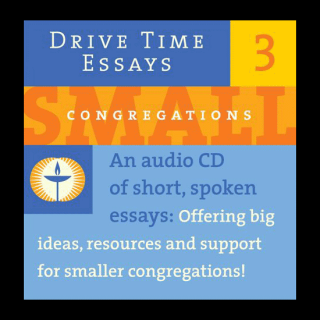Making the Leap with Fear and Trepidation: A Drive Time Essay on Emotional Systems
By Richard Speck

Drive Time Essays Volume 3: Small Congregations
Learn More
The small congregation faces many challenges as it attempts to grow. There may be space issues, fiscal issues, staff issues, and leadership issues. These issues will be even more daunting if we do not address the emotional system within the congregation. Emotions play a major role in the leadership of congregations, and if we do not take that into consideration as leaders, we will walk into situations that tear at the fabric of communal life and possibly thwart any growth that had been planned.
Emotional systems are found in every human family. We have learned ways of interacting with one another from our families of origin, and some of those ways of behaving can be detrimental to growing a vibrant and thriving community of faith. Have you ever witnessed an adult throwing a temper tantrum and insisting on getting their way? Have you ever heard someone state “My way or the highway”? When we see and experience this type of behavior within our congregations and we don’t confront it, we are experiencing the effects of the emotional system in harmful ways.
As congregations explore growth, they may move through an emotional roller coaster, as Gil Rendle describes in his Alban Institute book Leading Change in the Congregation. It is important that the leaders have the emotional intelligence and maturity to assist the congregation in moving through this ride. Change can be scary. It causes us a feeling of anxiety over what the future brings. If we grow, will I still find a place for me? Will I want to be a part of the envisioned congregation? Will I lose my church family?
Congregational leaders need to be able to have a healthy level of self-differentiation to resist giving in to the weakest members in their emotional development. This is not a technique that you can learn in one workshop, but a process of life-long internal exploration of learning who you are and what you stand for, being aware of your goals and values, and letting your convictions determine your behavior.
Being aware that we all operate in emotional systems helps the leaders of small congregations understand how to work with their membership as change is planned and carried out. It’s human nature to resist change. We don’t like it. When we ask our members and ourselves to learn new patterns of behavior, we get push-back. We need to expect this resistance, embrace it, and work with it.
By understanding the ways that emotional systems affect our leadership and others’ follower-ship, we can be more effective in leading change, and successfully moving our congregations to a new level of being that we call growth. Emotional maturity in the leadership can minimize the pain of change, assist others with it, and overcome the strong resistance forces that will attempt to keep the system at status quo.
To learn more about emotional systems, I recommend the highly readable Congregational Leadership in Anxious Times by Rev. Dr. Peter Steinke, published by the Alban Institute. May you have a healthy leadership and grow your small congregation.
About this Essay
Audio Essay Series: Volume 3: Small Congregations, Bonus Track 6 (MP3, 3:52 minutes)
About the Drive Time Essay Series
This Audio Essay series was created by the Unitarian Universalist Association of Congregations, for the purpose of supporting its valued lay leaders. Copying and sharing these essay texts, downloadable audio files, and the companion Lay Leader Drive Time Essays compact disc is welcomed and encouraged.